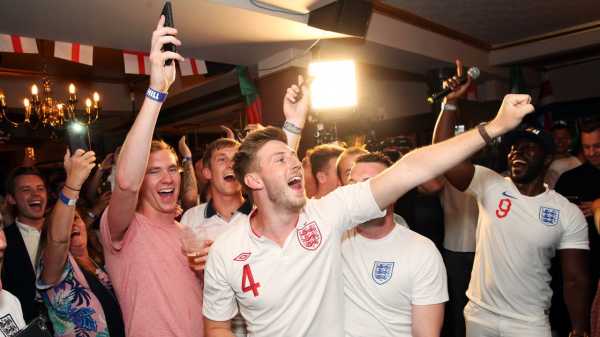
Not long after England won its quarter-final match, against Sweden, in the World Cup on Saturday, a tweet was sent out by @KensingtonRoyal, the official account of the Duke and Duchess of Cambridge, the Duke and Duchess of Sussex—that’s William, Kate, Harry, and Meghan—and their charitable foundation. “You wanted to make history @England and you are doing just that,” it read. (@England is the Twitter handle for the English football team, not, as one might imagine, the Dukes’ paternal grandmother.) “This has been an incredible #WorldCup run and we’ve enjoyed every minute. You deserve this moment—Football’s Coming Home!” The tweet was signed with a W, confirming that the tournament’s favorite meme had reached almost to the highest place in the land. In fact, no confirmation was really needed: earlier that morning, the royal Bands of the Guards Division had stood in the forecourt of Buckingham Palace and performed their rendition of what has in the past few weeks become England’s unofficial national anthem.
If you have not heard the original song from which the “Football’s Coming Home” meme is derived, be warned: it’s a virulent earworm. The song, the official title of which is “Three Lions,” and the music for which was written and performed by the Lightning Seeds, dates to 1996, and it has the melodic Brit-poppy catchiness of the most enduring songs of that era’s rich cultural flowering: think “Wonderwall,” by Oasis. The lyrics were written by the comedians David Baddiel and Frank Skinner, and are full of references to soccer players and institutional figures, celebrated goals and past glories, all of which are largely impenetrable to anyone who didn’t grow up in Britain in the sixties and seventies, as Baddiel, Skinner, and Ian Broudie, of the Lightning Seeds, did. (They are similarly impenetrable even to many of us who did grow up in Britain in that era. Thank goodness for Genius.) It has been suggested that part of the song’s enduring success may lie in what was at first thought to be an error of composition—that, rather than writing one chorus, or refrain, as would be expected in a typical pop song, Broudie wrote two of them. On the stands and in the streets—and on Twitter—it’s the “Football’s Coming Home” chorus that has been getting the better play, transformed into a repetitive soccer chant.

Further Reading
More coverage of the 2018 World Cup from The New Yorker.
But it’s the melancholy notes of the second refrain, the one giving the song its title—the English team shirt bears a heraldic crest of three lions passant-guardant—that lingers in the aural imagination. “Three lions on a shirt / Jules Rimet still gleaming / Thirty years of hurt / Never stopped me dreaming,” it goes, slipping from a major chord to its relative minor: A-flat major to F minor, then E-flat to C minor, over a steady descending bass line. There’s a bittersweet circularity to the tune, with a deliberate stiltedness to the arrangement. Performed by three men who were small boys when England last won the World Cup, in 1966, and who—the winningly sad-sack-y accompanying video reveals—had become overgrown boys in their early thirties, “Three Lions” was an exercise in nostalgia even when it was released. “I know that was then, but it could be again,” the song laments, as past victories are recollected and, in the video, reënacted.
“Three Lions” has a retro, Beatles-y feel to it, appropriate enough for a song that hearkens back to the glory days of England in the mid-sixties: “Revolver” was released less than a week after England’s World Cup victory. It would be fair to say that “Three Lions,” which has flat, thumpy percussion and vocals that are defiantly amateur-sounding, is less “Eleanor Rigby” than “Yellow Submarine.” The revival of “Three Lions” in the current World Cup tournament amounts to nostalgia wrapped in nostalgia wrapped in obliviousness: the obscurity of the lyrics means that a good number of fans have no idea what they’re singing about, or are persistently getting the words wrong.
Still, it works. Even if you don’t know the names of Nobby Stiles, or Bobby Charlton (members of the English team circa 1966), or even have no clue who Gary Lineker might be (England’s striker in 1990, now the host of Britain’s “Match of the Day”)—even if you don’t follow soccer at all except for the last week of the World Cup, every four years—the emotional core of the song is nonetheless clear. It has been suggested that the song is about the heartbreaking condition of being a fan, which, in soccer-centric terms at least, it is. But it is also a song about English defeat—or, to put it more precisely, English defeatedness. Although it was written by comedians, and although the video’s charm derives in part from silly physical comedy, “Three Lions” traffics more in pathos than humor. It begins with a couple of sampled clips from television commentators glumly holding forth about the poor chances of the English team—“I think it’s bad news for the England game,” “We’re not creative enough, and we’re not positive enough”—and progresses to include the verdict of the late Jimmy Hill, a celebrated English sportscaster: “We’ll go on getting bad results.” “Three Lions” was released to mark the fact that England was hosting the European Championship in 1996: England lays claim to being the birthplace of the modern game, hence the “coming home” refrain. (England lost to Germany in the semifinals of that championship.) But what the song really commemorates is the long passage of time since England’s last World Cup victory: those thirty years of hurt. It’s a song about decline and regret and loss, about the tempting allure of resignation—the English emotional default—and the terrible pain of hopefulness.
That this dual tension—between victory and loss, triumph and despair—should resonate with the English makes sense, since a narrative of decline is one of England’s favorite stories it tells about itself: it’s been all downhill since the end of the Second World War, or the end of Empire, or 1066, depending on whom you ask. Two years ago, enough Britons thought that it had been all downhill since the U.K. joined the European Union to vote to leave it, in the Brexit referendum. The Brexit vote was, by many well-informed accounts, an own goal of epic proportions; but that has not mitigated the Conservative government’s commitment to enact the mandate. The World Cup championship has happened to coincide with high-stakes negotiations within the British government for how to proceed with implementing a withdrawal from Europe without entirely crashing the country’s civic and economic stability. This is, naturally, a delicate and perhaps impossible task, one which has precipitated the resignation, in the past few days, of two pro-Brexit Cabinet ministers, including Boris Johnson, the Foreign Secretary, who reportedly said that defending Prime Minister Theresa May’s proposed deal with Europe would be like “polishing a turd.”
As a result, England hovers this week between national euphoria, in celebration of last Saturday’s victory, and national pandemonium, as the Prime Minister faces the possible collapse of her government. The Sun newspaper devoted its front page on Tuesday to a plea to postpone further political meltdown until after Wednesday night’s semifinal match, against Croatia: “Don’t You Know There’s a Bloody Game On?” the headline read, over an image of Johnson wearing an England shirt emblazoned with the three-lions crest. The dual refrains of “Three Lions”—the rousing hopefulness of “football’s coming home” paired with the inescapable melancholy of “thirty years of hurt”—could not feel more apropos for England’s current bifurcated, contradictory, deeply confused condition. The enduring genius of the song, nearly a quarter century on, is its ability to reconcile those two opposite impulses of hopefulness and despair, and to sublimate them into an irresistible anthem with which everyone can sing along. This is, of course, a feat more easily achieved in song than in politics. Adding to the pathos of “Three Lions” this time around is the fact that the home to which the song refers is so contested, fractured, and diminished. The tug of nostalgia that “Three Lions” delivers now is not just for 1966 but for 1996, and a moment when losing the European Championship, rather than losing Europe itself, was all there was to worry about.
A previous version of this post misstated the name of the European Championship.
Sourse: newyorker.com






